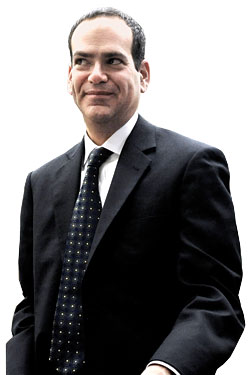
Neil Barofsky doesn’t have many friends in Washington. “My job is to be a pain in the ass,” explains the special inspector general of the Troubled Asset Relief Program, whose official mandate is to monitor the administration of the bailout. We’re at the Daily Grill, which, as the name suggests, is nothing special—one of those bland Washington lunch places where pretty much everyone is wearing a blue shirt and tie. But it’s barely a block from his office, which is good, since there are many D.C. derrières requiring his attention. He advises me to order bottled water. “The water in D.C. is terrible. It’s not like New York,” he says. “I’m that horrible New Yorker who gets transplanted to Washington and always talks about how much better things are in New York.”
As a former assistant U.S. Attorney for the Southern District of New York for eight years, he went back and forth to Bogotá to prosecute drug traffickers. Barofsky, 39, brought that same prosecutorial zeal to his work as the “TARP cop” since he was appointed by Bush in 2008. On January 27, the day before we meet, both Treasury Secretary Tim Geithner and former Treasury secretary Hank Paulson were flagellated by the House Committee on Oversight and Government Reform with facts from Barofsky’s meticulously researched report. Barofsky himself testified that day about the Federal Reserve’s controversial decision to use taxpayer money to pay financial institutions like Goldman Sachs full price on contracts with the failing AIG, among other things. (“They could have tried a little harder” to get the banks to make concessions, he told the committee.)
“We’re not trying to provoke people, or be sensational,” Barofsky says, sipping a Diet Coke and ignoring his margherita pizza—despite his reputation as a pit bull, he’s a strict vegetarian—“We’re just trying to tell the truth.”
But the truth, as he tells it, is pretty provocative. “I think we’re in a horribly dangerous place right now,” he says. “Step one was, we saved the banks. Step two was, we encouraged them and enabled them to become bigger than ever and more interconnected than ever. We enabled acquisitions. Banks that would have otherwise fallen were buttressed. And now we’ve let them leave the TARP program, so whatever thin leverage we could have had as shareholders is gone. Meanwhile, it’s not like they’ve all returned to profitability; you still see some of them posting billions of dollars in losses. And in case anyone out there has any question of whether we’re going to let big, large, interconnected firms hit the rocks, not only have we shown throughout this crisis that we haven’t but we now are maintaining an enormous war chest under the TARP. You’ve made it worse in trying to rescue them, you’ve let them out, and there is nothing in place to prevent 2008 from happening all over again. We have to do something, and fast.”
Barofsky, a Democrat, knows that these bouts of compulsive honesty don’t make him “the most popular person in the Treasury Department,” or in the administration, but as he sees it, it’s his responsibility. “I took this job, and there’s only one way to do it, which is without worrying about anything but the truth, and delivering to the taxpayer what they deserve, which is an honest appraisal of what happened.” Not that it doesn’t bother him, just a little. “People are always telling me how much various people [in the administration] hate me, and it weighs on you,” he says with a sigh. “My job isn’t to make the Treasury Department look bad. I want them to be great, that’s the idea, that I make recommendations to them to make sure this program won’t be as unpopular as it has been.” He can’t resist adding, “But you know, this Treasury Department and the last Treasury Department, and this administration and the last administration, they bear some responsibility for the anger and hatred of this program. If in the very beginning, if there was more honesty, more being straightforward with the American people, it wouldn’t necessarily be this way.” Talking this way is making him somewhat popular, or at least well known. After his testimony last week, a host on Fox Business News suggested he run for president.
He recalls how at his first hearing, Richard Shelby, the ranking Republican on the Senate banking committee, came over to introduce himself. “He looked down at me and he goes”—Barofsky affects a southern drawl—“ ‘Mister Inspector General, if you do this job right, you’re never going to be able to work again. You’re never going to find another job. And that’s a good thing.’ ” Barofsky laughs. “My wife wasn’t so sure.”
For the moment, at least, he doesn’t have to look. Troubled TARP should keep him busy for years. “Right now, I serve at the pleasure of the president,” he says. “If I eventually cause him too much displeasure, it may be time to move on.”
Have good intel? Send tips to intel@nymag.com.